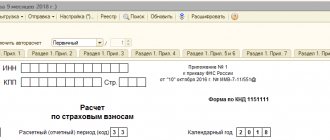The state controls all processes occurring within it. The business sector is no exception. Any business activity is subject to strict rules of accounting and reporting. From time to time, tax authorities conduct various types of audits of taxpayers. In this text you will learn the basic rules for conducting various types of audits, as well as the most important nuances of the moratorium on tax audits for 2017-2018.
Entrepreneurs, in the course of their activities, inevitably interact with government regulatory authorities. Often, this interaction occurs as a result of some kind of checks to ensure that the entrepreneur’s activities comply with current legislative norms. The Federal Tax Service is authorized to carry out various inspections of business activities in order to control and supervise its legality and correctness of implementation. In this article you will find all the necessary information on tax audits, and also learn the nuances of the moratorium on tax audits in 2017-2019.
What is the procedure for conducting an on-site tax audit in 2017–2018
An on-site tax audit consists of the following stages:
- The decision by the head of the Federal Tax Service to conduct an on-site tax audit.
What this document is can be found in the publication .
- Implementation of measures to verify the compliance of accounting and tax records of the taxpayer with the norms of current legislation.
These actions are accompanied by:
- requesting the necessary documentation and explanations justifying a particular business transaction;
Details are in the articles:
- «What documents are tax authorities entitled to request during an on-site audit?»;
- «How tax authorities request clarifications from taxpayers».
However, in practice, the Federal Tax Service often requests documents that are not related to the subject of an on-site tax audit.
You will learn how to respond to such requests from the recommendations contained in the material “For an on-site inspection, the Federal Tax Service requires deciphering the accounting reporting lines. Should I comply with the requirement? .
- involving witnesses, specialists (including translators);
- inspection of premises; At the same time, it is possible that during the inspection tax authorities may conduct an inventory;
“The person being audited must assist tax authorities in taking inventory” will help to organize such a procedure correctly for the Federal Tax Service .
- carrying out examinations;
- seizure of documents.
- Completion of the procedure is accompanied by the preparation of a certificate that contains the substantive content of the on-site tax audit, as well as its period.
What are tax authorities looking for?
It would be more correct to say – EVERYTHING. Previously, inspectors focused their attention on costs. They were looking for unreasonable expenses in order to charge additional VAT and profit. Now they will also look for undeclared income.
Moreover, in both cases, keep in mind that even the denunciation of a fired employee is suitable for tax authorities as evidence. Even if the employee did not work during the audited period, this denunciation is accepted in court. The courts side with the tax authorities. Tax authorities use employee testimony very actively. They find a dissatisfied person (and there are many of them everywhere) and conduct an interrogation in the right direction. Often employees do not even understand that their (innocent) words later form the basis for accusations against the company’s management.
Judicial practice shows that the courts side with tax inspectors.
How is the period for conducting an on-site tax audit calculated?
The period for conducting an on-site tax audit usually varies from 2 to 6 months. This depends on the following factors:
- whether the company is one of the largest taxpayers;
- does it have separate divisions;
- whether the taxpayer violated the deadlines for submitting the requested information;
- other factors.
They are described in detail in this material .
Please note that an on-site tax audit may be suspended for up to 6 months (or up to 9 months in case of waiting for information from foreign authorities within the framework of international contracts). Such suspension is carried out by transferring the relevant decision to the person being inspected. From the moment the on-site tax audit is “frozen,” its period ceases to be calculated and tax authorities no longer have the right to:
- be with the taxpayer;
- request documents;
- inspect the premises;
- carry out other activities.
You will learn about what these events are from the publication “What is the deadline for conducting an on-site tax audit?” .
Please note: if the tax authorities made a demand and then suspended the audit, the obligation to submit documents remains with the taxpayer.
Our article “Suspending the inspection will not extend the period for submitting the requested documents” .
The number of such “freezes”, according to clause 9 of Art. 89 of the Tax Code of the Russian Federation, may be equal to the number of counterparties of the taxpayer being audited. At the same time, the deadlines continue to be calculated after the resumption of the on-site tax audit, which is accompanied by the adoption of an appropriate decision.
What risks arise when working with clients?
Let's say there is a company that sells windows. If it operates on a postpaid basis, then it constantly faces commercial risks. For example, she shipped the goods to the client, but did not receive the money. As a result, I was left without goods and without money. In this case, a 100% prepayment would completely protect her from adverse commercial consequences, since she would receive the money even before the goods were shipped.
At the same time, working with clients has nothing to do with tax risks. The tax office will not check your clients and make claims against you. The only exception is a counter tax audit, when you may be interested in the audit of the supply chain.
How to appeal an on-site tax audit report
The completion of the on-site tax audit is evidenced by a certificate drawn up by the tax authorities. After its registration, inspectors have 2 months to draw up and submit an act (Clause 1 of Article 100 of the Tax Code of the Russian Federation), which indicates:
- date of;
- details of the person being checked;
- Full name of inspectors from the Federal Tax Service;
- number of the decision to conduct the inspection;
- documents submitted by the taxpayer;
- review period;
- other important information.
This is discussed in more detail in the material . Here you can also find a sample act.
After receiving the report, the taxpayer has the opportunity to appeal within a month. “Objections to an on-site tax audit report - sample” will tell you how best to do this .
After considering the objections, the Federal Tax Service Inspectorate within 10 days (according to paragraph 1 of Article 101 of the Tax Code of the Russian Federation, this period can be extended by 1 month) makes a decision on whether or not to hold the person being inspected accountable.
What documents should the inspector not require from the organization?
The list of documents that an inspector may request has been reduced as of July 1, 2021.
The inspector cannot request documents that he can obtain from other government agencies. For example, certificates of absence of debt on insurance premiums, cadastral passports of real estate objects, certificates of their cadastral value, extracts from the Unified State Register of Legal Entities, Unified State Register of Individual Entrepreneurs, Unified State Register and other state registers.
In total, 153 types of documents were banned. Their complete list was approved by Decree of the Government of the Russian Federation dated April 19, 2016 No. 724-r.
Where can I get a plan for on-site tax audits for 2021?
The plan for on-site tax audits is annually posted on the Federal Tax Service website until December 31 of the year preceding the year of control activities. Therefore, 2021 has already shown who will face an on-site tax audit in 2021.
Taking into account clause 4 of Art. 89 of the Tax Code of the Russian Federation in 2021, tax authorities can conduct an on-site tax audit in relation to 2015, 2021, 2021. At the same time, the arbitrators admit that during an on-site tax audit, regulatory authorities have the right to request documents from the current year, i.e., in addition to the previously indicated years, you must be prepared to submit documentation relating to 2021.
Details are in our materials:
- “The RF Armed Forces recognized that an on-site inspection of the current calendar year is legal”;
- “Does the tax authority have the right to check the current year?”.
Moratorium on inspections 2017-2019
Judging by statements by state officials, the decision to introduce this moratorium was made to reduce pressure on certain business areas and stimulate them in the context of a geopolitical and economic crisis.
Federal Law No. 246-FZ of July 13, 2015 amended the Federal Law “On the protection of the rights of legal entities and individual entrepreneurs in the exercise of state control (supervision) and municipal control” dated December 26, 2008 No. 294-FZ (hereinafter referred to as the law 294 Federal Law).
In particular, Article 26.1 was added to Law 294 Federal Law, which determines that for 3 years (2017, 2021 and 2021) individual entrepreneurs and legal entities related to small businesses are exempt from scheduled inspections. In addition to individual entrepreneurs and legal entities engaged in the types of activities specified in Part 9 of Art. 9 of Law 294 Federal Law (activities in the areas of education, healthcare, heat supply, social, energy, energy saving and increasing energy efficiency), as well as persons specified in Part 6 of Art. 26.1 of Law 294 Federal Law.
Individual entrepreneurs and legal entities falling under the moratorium may be included in the inspection plan in the following cases:
- If, previously, a resolution was issued for them providing for administrative punishment for a gross violation of the legislation of the Russian Federation, and it came into force, or an administrative punishment providing for disqualification or suspension of activities;
- If a decision was made against them to cancel or suspend their license based on the results of an inspection, from the end of which less than 3 years have passed.
A risk-based approach has been added to the “arsenal” of methods for assessing taxpayers by tax authorities, which will begin to be applied from January 1, 2021. However, the Government of the Russian Federation can establish certain types of control, which already include the newly introduced approach, and until January 1, 2019.
The risk-based approach involves determining the relationship between the frequency of control activities (inspections, etc.) and legislative violations in the activities of individual entrepreneurs and legal entities, as well as the potential for violations and non-compliance with mandatory requirements.
The higher the established level of risk for a particular taxpayer, the more often he will be subject to audits. Accordingly, the lower the risk level, the less frequent the inspections and control activities. This leads to the conclusion that any taxpayer should strive to minimize risk levels.
Despite the clear positive emphasis of the changes, some experts fear that the authorities responsible for determining the level of risk may use this right in their own interests, thus infringing on the rights of “selected” taxpayers. What will actually happen, time will tell, and the results of integrating the risk-based approach system.
Can an on-site audit be carried out on taxpayers who are not included in the audit plan?
Current legislation does not contain such a thing as an unscheduled on-site tax audit, although in practice this happens.
Let's consider the most common situations when the Federal Tax Service can conduct such an on-site tax audit:
- Liquidation or reorganization of a taxpayer. In this case, the verification period is also 3 years, which precede the year of the event.
- Carrying out a repeat inspection, the grounds for which are:
- decision of a higher tax authority - such an audit is carried out in order to control the activities of the subordinate Federal Tax Service;
- submitted updated declaration.
Read about the specifics of the inspection as part of submitting an update in the material “ When submitting a decreasing update, a repeated on-site inspection of periods “over 3 years” is possible . ”
- Upon receipt of information about a taxpayer’s violation of current legislation. However, such information can be obtained from individuals, organizations or law enforcement agencies.
Thus, on-site tax audits in 2017–2018 may not have been included in the Federal Tax Service’s plan, but in the presence of the above circumstances, they can still be carried out.
An on-site tax audit, taking into account the specifics of its implementation, is always a labor-intensive and lengthy process. What characterizes an on-site tax audit, what is the procedure for conducting it and other features of this control event, you can always find out from the publications in our “ On-site tax audit ” section.
Liquidation and closure of individual entrepreneurs: should there be an audit?
When an individual entrepreneur liquidates an activity, he submits reporting documentation to the tax office. And the question arises: when closing an individual entrepreneur, will there be a tax audit or not?
It is impossible to answer the question unambiguously. Tax inspectors have every right to do this. When closing an individual entrepreneur, the tax office conducts an audit within 4 or 5 months after cessation of activity. The reason for carrying out can be any reason (the same as for creating a plan for on-site inspections).
How the tax office builds an evidence base
When conducting desk audits on VAT, the tax office uses a special ASK VAT program. It compares the data for one transaction, and if they do not match, an automatic gap requirement is generated, which signals an overstatement of tax deductions by the buyer or an understatement of the amount of tax payable by the seller. According to such requirements, tax control measures are carried out along the entire chain of counterparties. The ASK VAT system shows low, medium and high tax risk; they are color coded.
Having in hand information about companies from the ASK VAT system, tax officials use a professional service for checking legal entities, for example, Kontur.Focus, and then look in detail at the information about the taxpayer they are interested in.
Save time on assessing the reliability of the company and reduce commercial and tax risks of the transaction.
To learn more
The attention of inspectors may come to companies that did not exercise due diligence and treated the inspection of the counterparty formally.
As part of the audit, the tax office may summon the director of the company for questioning. The Letter of the Federal Tax Service of the Russian Federation dated July 13, 2017 No. ED-4-2/ [email protected] contains a list of questions that help Federal Tax Service employees clarify the situation regarding transactions. One of the important questions is whether the organization has documents regulating the process of verifying counterparties?
How to use Focus to interpret information about a counterparty
In the process of monitoring a client or supplier in Focus, it is important to assess the commercial risks that may arise in case of cooperation with him.
The challenge is not to lose money. Although commercial and tax risks overlap greatly.
Focus allows you to see signs of financial and economic activity. It is important to make sure that, that is, it functions.
The following indicators will help you assess your financial condition.
- Financial condition rating (probability of bankruptcy).
- Availability of money to fulfill obligations. Pay attention to the size of the authorized capital: the larger it is, the better. The size of the authorized capital indicates how much the company is able to pay in the event of bankruptcy or liquidation. If we are talking about several thousand, then you should be wary.
- Paying taxes. The presence of debt in itself does not indicate the supplier’s dishonesty, but is a signal that is worth paying attention to.
- The size of short-term and long-term loans and the share of receivables. If last year the company was in debt and had high accounts receivable, then in a year it is unlikely that everything will improve dramatically.
- Availability of periodically won and executed government contracts. You can compare the amounts under government contracts that the organization operates with the amount under your contract. If the amounts are comparable, then the risk is lower than if the amount of your transaction is ten times higher than the company’s usual transactions. In addition, when a company takes part in government contracts under 44-FZ, it undergoes an inspection. At the same time, it is important to pay attention to executed, and not just concluded, government contracts. If a company wins the tender and does not fulfill it, it may be included in the Register of Unscrupulous Suppliers for three years.
- The presence of related organizations with a satisfactory level of revenue and net profit.
- The average number of employees must be adequate to the company's activities. If the company employs few people, and contract work requires a large staff, then this is a reason to ask the supplier a question about how he plans to fulfill his obligations. Perhaps he enters into an agreement with another legal entity and transfers to him part of the work under the agreement.
- Leasing agreements. If a company provided machines or equipment on lease, it means that it was checked by the lessor and he was prepared for the risks that may arise during cooperation.
- Availability of arbitration cases as a plaintiff. It is worth paying attention to the amounts to understand whether your transaction falls into the “ordinary” category. It would be a good idea to familiarize yourself with the arbitration cases themselves and see how your supplier builds its defense in cases as a defendant. It is quite possible that he does not pay anything until they start suing him.
- Membership in the Chamber of Commerce and Industry (CCI). Joining the Chamber of Commerce and Industry requires a membership fee. In addition, the company needs to pass a commission, which will have to prove the actual conduct of business activities and provide a strategy for the development of the enterprise for several years ahead. This check is carried out regularly.
- Valid certificates and declarations. Their presence may indicate that specialists came to the actual place of business, and the goods that must be certified or declared were checked on site.
- Issued licenses. Licenses are also issued at the place of work of the enterprise after inspection.
- Trademarks. To obtain them you need to spend both time and money. If they are, it means the company is serious about the business.
- Completed scheduled inspections. The inspection body visits the actual place of work of the company, which is also an indirect sign that the company is conducting material and economic activities.
- Open and archived vacancies. They testify to the personnel scale of the company, its activities - if it recruits staff, therefore, it develops, expands, and opens new directions.
- Absence of a company in special registers of the Federal Tax Service: management is disqualified and cannot occupy leadership positions; the director or founder may be the nominee or owner of many other firms; The company's legal address was not found; registration address can be mass; there is a debt to the Federal Tax Service of more than 1,000 rubles; the company has not submitted tax reports for more than a year.
Please note that it makes no sense to consider all of these factors separately. But taken together they form a complete portrait. And the more information about the company you managed to collect, the easier it is to assess the risk of working with it. On the contrary, if there is no information about the company, this is a reason to ask the counterparty clarifying questions, perhaps meet him personally in his office or production facility, and request additional documents.
What tax preferences and benefits do companies have?
Each company has many preferences, but in this case we will focus on the following:
- the right to deduct VAT;
- income tax expenses.
The company is required to pay a 20% tax on its profits. Profit should be understood as what remains after deducting expenses from income. If an individual entrepreneur or company uses the simplified tax system, then instead of 20% they pay 6% of income or 15% of the difference in income and expenses.
What are the dangers of depriving the right to expense a transaction?
When the Federal Tax Service decides that the transaction for 1 million rubles that you concluded with the supplier is invalid, it declares that you do not have the right to expense this transaction.
To understand how this impacts the company’s economy, consider the following example: let’s say your company’s income was 10 million, expenses were 1 million rubles, and if you cannot expense a transaction with a supplier worth 1 million rubles, then the tax amount will be will be more by 200,000 rubles.
In addition, fines and penalties are imposed on the amount. The fine is paid on the amount of tax you must pay (VAT and income tax).
According to Art. 122 of the Tax Code of the Russian Federation, if tax authorities prove intent, then the fine is 40% of the unpaid tax amount. If the act is regarded simply as non-payment or incomplete payment of the tax amount, then 20%.
On the amount of unpaid tax, penalties are charged in the amount of 1/300 of the refinancing rate (5.5%) for each day of delay from the due date for tax payment. And since you did not credit this money to the budget on time, penalties are charged for each day of delay.
In what cases does the court initiate a criminal case?
If the tax authorities prove intent in concluding a dubious transaction, then a case may be initiated against the head of the enterprise under one of the articles of the Criminal Code of the Russian Federation: Art. 199 for non-payment of tax on a large scale or Art. 159 for fraud.
How does deprivation of the right to deduct VAT occur?
The main risk that arises during a tax audit is the deprivation of the company's right to deduct VAT. But to assess this risk, you need to understand what VAT is.
Let’s say Romashka LLC produces a product that costs 100 rubles. When the company sells it, 20 rubles are added to this amount. VAT. The total cost of the product is 120 rubles. It is for this amount that the next legal entity, Vasilek LLC, buys goods from her. In turn, “Vasilek” sells this product to an individual, for example, for 200 rubles. And VAT in the amount of 40 rubles is added to this amount. Thus, an individual buys goods for 240 rubles.
“Cornflower” must pay tax (VAT) to the budget - 40 rubles. But he initially purchased this product for 120 rubles, of which 20 rubles. VAT has already been paid by Romashka. If “Vasilek” pays 40 rubles. and “Chamomile” 20 rubles, then the Federal Tax Service will ultimately receive 60 rubles, but should receive 40 rubles.
Therefore, when at the end of the reporting period “Vasilek” submits a tax return, he indicates in it that he must pay not 40 rubles, but 20 rubles. VAT. The remaining 20 rubles. he will apply for deduction.
When the tax authorities deprive a company of the right to deduct VAT, it essentially deprives it of the opportunity to deduct a certain amount received as a result of a transaction with a supplier. And so on for every transaction.
How do tax violation cases arise?
If the tax office finds discrepancies in the submitted return, the directors of the company may be summoned for questioning or questioning in order to understand specific transactions. If he agrees with the claims, the company will add an additional amount. In addition to this, the Federal Tax Service may launch an audit on other transactions.
When an arbitration case arises, tax specialists will not just prove the fact that a specific transaction was fictitious, they will prove intent. Their task is to make sure that the counterparty is a bona fide person and is conducting real business.
It does not matter whether the counterparty with whom you enter into an agreement pays taxes. The four criteria listed above are important.







